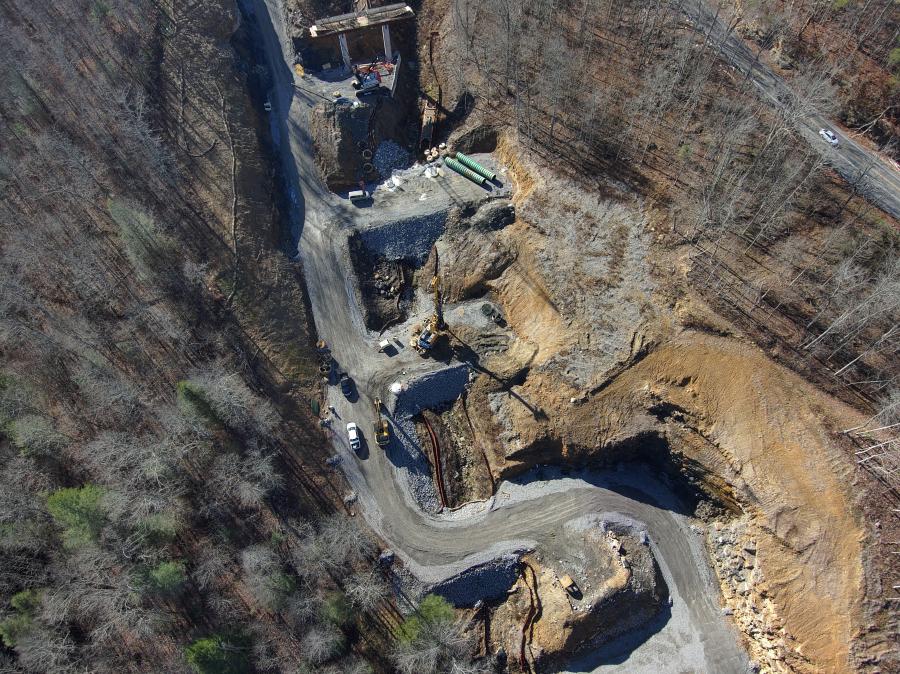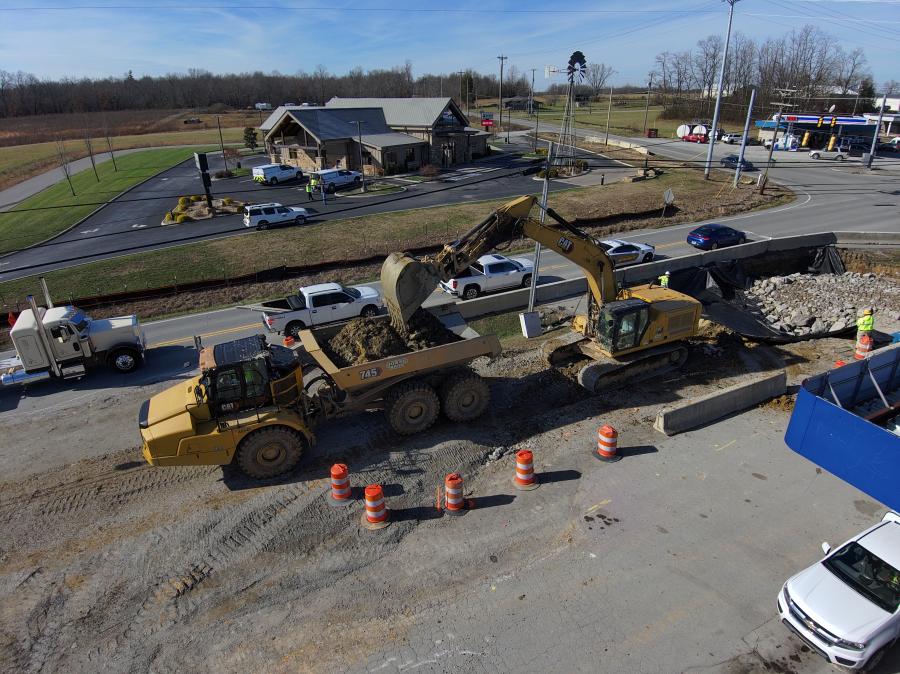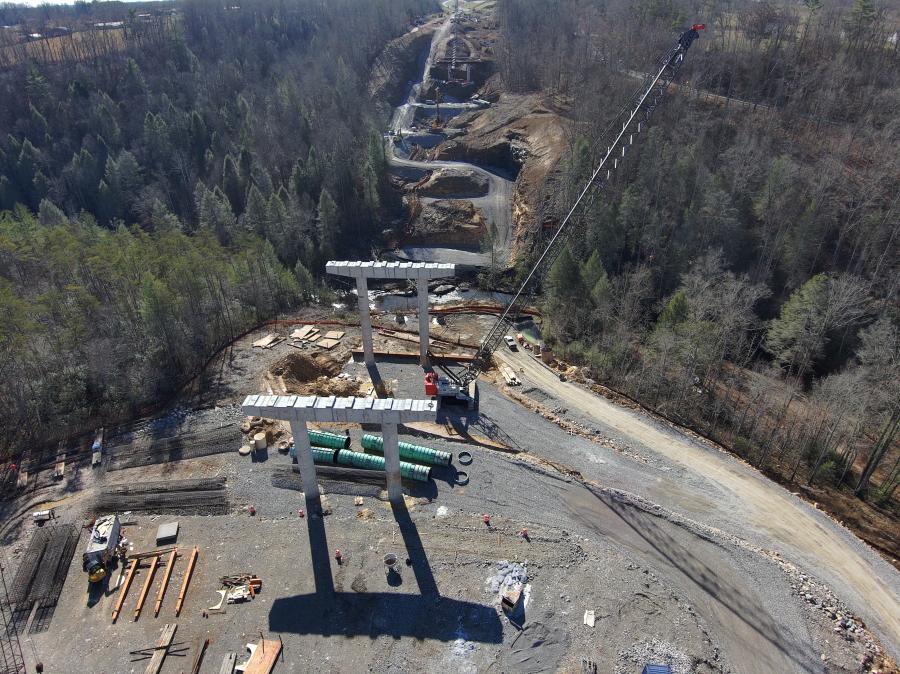Photo courtesy of TDOT
Funding for the project, estimated at $78 million, includes federal, state and other local sources and some utility companies, but no state or transportation grants.
The Tennessee Department of Transportation (TDOT) is on track to complete construction work on Clear Creek Bridge by 2026, to help enhance traffic flow and connect the towns of Crossville and Jamestown. Work began last year on the project along U.S. Highway 127 starting 11 mi. north of Interstate 40 in Cumberland County into Fentress County. That's about 3.2 mi. and covers almost 117 acres.
The construction is part of Tennessee Gov. Bill Lee's efforts to address challenges and provide growth opportunities for rural and economically distressed communities in the state. He visited the project site in June, the initial stop on his Build With Us tour, to highlight his agenda and talk about the Transportation Modernization Act that was passed into law in April, which will see $3.3 billion invested in transportation and mobility needs across the state. Funding for the project, estimated at $78 million, includes federal, state and other local sources and some utility companies, but no state or transportation grants.

Photo courtesy of TDOT
"The work includes the demo of several existing structures, residences, storage buildings, a lot of clearing of vegetation, moving lots of earth, utility relocations, the addition of several drainage structures, the relocation of streams, a new natural stream design, the installation of a new retaining wall, a new bridge that will be approximately 1,425 feet long standing over Clear Creek and it also includes an existing bridge repair which is where the current road goes over Clear Creek," said Josh Neal, TDOT project manager. "This includes the construction of a new urban intersection with curb, gutter and sidewalks."
Currently, the contractors are working on the construction of the bridge foundations and constructing roads to haul material in and out. The project involves three milestone phases: The pre-construction phase clearing the area and having measures in place to commence construction; phase one for existing bridge repair, which is on the old alignment of the road that the traffic is using currently until the new bridge is constructed and the new alignment is shifted over; and the second phase for construction of the bridge work and the haul roads. Contractors will remain fully in that phase until the bridge is constructed and traffic can get moved over to the new alignment.
The prime contractor is Mt. Juliet-based Jones Bros. Contractors, who are not just building the bridge but overseeing the entire project. Other subcontractors are assisting with electric work, gas relocation, water and sewer installation, communication lines relocation and other vital aspects of the construction. An average of 50 crew members are on-site at any time, working mostly weekday and some weekend shifts to see the project to a punctual completion.
A job of this caliber demands about 850,000 cu. yds. of excavation; 80,000 tons of base stone; 9,000 cu. yds. of concrete mainly used on the bridge construction; 18 drill shafts and columns that range anywhere from 6 to 9 ft. in diameter; 100 precast concrete beams; 2 million lbs. of reinforcing steel; and 45,000 tons of asphalt for the roadways.
Adam Casteel, regional director of operations, shared that challenges were many given the environmental impacts of construction around Clear Creek.
"There is in the neighborhood of 200,000 cubic yards of acid producing material that was naturally occurring in the area. When we do our excavation and expose it, we have a lot of environmental procedures that we have to follow to neutralize it. We also have to make sure it's contained because if rain hits it and there's runoff, it could create issues for the environment. So we have procedures in place to address those concerns that we have to follow as we do our excavation in the area."

Photo courtesy of TDOT
The biggest challenge developing this project on the front end was with accessing the steep terrain in the area. The geotechnical engineering team's role was crucial and several contractors were consulted before the letting to get feedback on how this would be addressed.
"Another challenge was the general environmental sensitivity of the area. Clear Creek is defined by the Tennessee Department of Environment and Conservation as an Exceptional Tennessee Waters because it has outstanding water quality and is a habitat for numerous aquatic species — 52 native fish species, eight freshwater mussel species and numerous other aquatic species call it home," Casteel said. "Any rain brought challenges in containing the runoff to keep it from causing impacts to all these species in the area. Clear Creek also is a major tributary to the Obed River, a national wild and scenic river that's managed by the National Park Service. We have several regulatory agencies that are working with us that have a high level of interest in the project including Tennessee Department of Environment and Conservation, Tennessee Wildlife Resource Agency, the U.S. Fish and Wildlife Service and the U.S. Army Corps of Engineers."
Casteel added, "We're looking at the entire Cumberland-Fentress U.S. 127 corridor and how we can provide better access to the area. We broke it down into five projects — two that are currently under construction and three that are being developed. These five projects provide a great example of Governor Lee's focus on opening up rural communities by providing better access to locals and visitors and more opportunities for economic growth." CEG
Ruksana Hussain
Ruksana Hussain is a Los Angeles, California-based award-winning journalist with 19 years' experience working with local, national and international print and digital media for consumer and trade markets. As a magazine editor and features writer, she covers a broad range of topics including construction and design, diversity and inclusion, data privacy and security, and more. She earned her bachelor's degree in sociology in India. Leisurely pursuits include traveling, random researching and attempting word puzzles of any nature.
Read more from Ruksana Hussain here.
Today's top stories




















